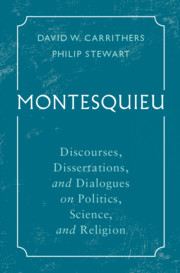Book contents
- Montesquieu
- Additional material
- Montesquieu
- Copyright page
- Contents
- Abbreviations
- A General Note on the Texts
- Introduction
- i The Uses of Science
- ii The Romans
- iii Reflections on National Character
- iv Politics and Morality
- v Statecraft
- vi Economics and Fiscal Policy
- vii Defense of The Spirit of Law (1750)
- Montesquieu Chronology
- Bibliographical Note
- Index
iv - Politics and Morality
Published online by Cambridge University Press: 02 November 2020
- Montesquieu
- Additional material
- Montesquieu
- Copyright page
- Contents
- Abbreviations
- A General Note on the Texts
- Introduction
- i The Uses of Science
- ii The Romans
- iii Reflections on National Character
- iv Politics and Morality
- v Statecraft
- vi Economics and Fiscal Policy
- vii Defense of The Spirit of Law (1750)
- Montesquieu Chronology
- Bibliographical Note
- Index
Summary
The texts in Part Three of the volume reveal Montesquieu’s moral idealism and life-long concern with ethics. He was clearly a moral theorist as well as a political philosopher. In his In Praise of Sincerity (1717) he stresses the importance of providing moral guidance to one’s friends by speaking to them honestly regarding their shortcomings. In his Treatise on Duties (1725) Montesquieu stresses the need, recognized by the Stoics and by Cicero, to observe human duties and attacks Thomas Hobbes by asserting contra Hobbes that there are absolutes of justice traceable to nature and attacks Baruch Spinoza by proclaiming that the world was created by design, not “blind fate.” In his Consideration and Reputation (1725) he observes that we crave the esteem of our friends even more than we desire birth, wealth, positions, and honors, and yet we neglect “probity, good faith, and modesty,” because these traits are undervalued by our friends. In his Discourse on the Equity that Must Determine Judgments and the Execution of Laws (1725) Montesquieu asserts that the “essential virtue” for a judicial magistrate is “justice, a quality without which he is but a monster in society.”
- Type
- Chapter
- Information
- MontesquieuDiscourses, Dissertations, and Dialogues on Politics, Science, and Religion, pp. 98 - 154Publisher: Cambridge University PressPrint publication year: 2020

